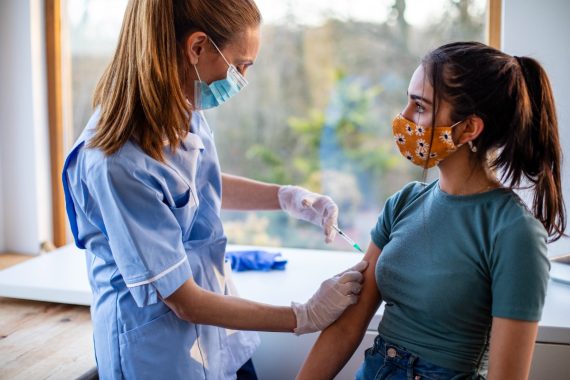GPs should review whether the reduced fee for delivering Covid jabs from September impact their ‘ability to undertake the enhanced service’, the BMA has said.
NHS England last week published the new enhanced service specification for the autumn booster programme, with the service to begin on 1 September 2022 and continue for an ‘initial period’ until 31 March 2023.
It set out that GP-led sites will be paid a £10.06 item of service (IoS) fee for each vaccine administered – down from £12.58 – and continue to be paid £10 for each housebound patient.
A notice shared by Cleveland LMC said: ‘NHS England has now published an updated enhanced service specification for the Covid 19 vaccination programme, alongside a covering letter. Practices should note that the programme from September will pay a reduced Item of Service fee of £10.06 per dose.
‘As a result, GPC strongly recommend that practices review the impact that this funding reduction will have on their ability to undertake the enhanced service.’
The LMC bulletin also reminded GPs that the deadline to sign up for the service is next week, at 5pm on 14 July.
NHS England’s guidance stressed that only GP practices with ‘sufficient workforce capacity’ should opt in to give Covid boosters ‘so as not to impact the delivery of essential services’.
In its preliminary plan for autumn Covid boosters, published last month, NHS England had said the programme must not ‘rely too heavily’ on GP practices.
It also suggested they may no longer be paid via item of service (IoS) fees in the vaccination programme’s next stage, with ‘variations to the Covid-19 vaccination contracts for general practice’ to be published shortly.
It said: ‘The existing financial framework – a mix of item of service and reimbursement – remains in place to the end of August.
‘From September, to give greater flexibility to systems to meet the needs of local communities, we will be issuing fixed allocations. These will be based around a fixed unit payment across all delivery models, with an additional supplement for people who are housebound.’
In May, the Joint Committee on Vaccination and Immunisation (JCVI) recommended another autumn booster vaccine for some at-risk groups and frontline health and social care workers, under interim guidance.
This includes all those aged 65 and over, residents in a care home for older adults and staff, frontline health and social care workers and adults aged 16 to 64 years who are in a clinical risk group.
However, NHS England has told commissioners to plan for a ‘maximum scenario’ of autumn boosters for all over-50s, as well as care home residents and carers, frontline health and social care workers and those in clinical risk groups – ‘subject to final JCVI advice’.
The ‘minimum scenario’ it told them to prepare for is the same as the JCVI’s interim advice.
Meanwhile, NHS England said last month it would begin consulting with GPs about its development of a future ‘integrated vaccination and immunisation strategy’ and service.
Pulse October survey
Take our July 2025 survey to potentially win £1.000 worth of tokens















sorry – costs for everything are going UP – staff, fuel to get to housebound patients, fuel to heat/light surgery, waste collection etc. how can bringing the remuneration for a service DOWN possibly encourage anyone to do it ?
just thinking out loud !!
For the sake of devils advocate – compared to the first round of covid vaccinations we did in 2021, if we did them in September we would:
– Have vaccinators doing twice as many per hour
– Have less worries about monitoring patients after the vaccination
– Have fewer questions from the public
Which all need to be taken in to account when considering your business case. That is alongside the quite reasonable increases in expenses pointed out by David J above.
It brings it in line with other vaccinations – and the issues highlighted by David J above apply to flu vaccines too. Would you stop doing those?